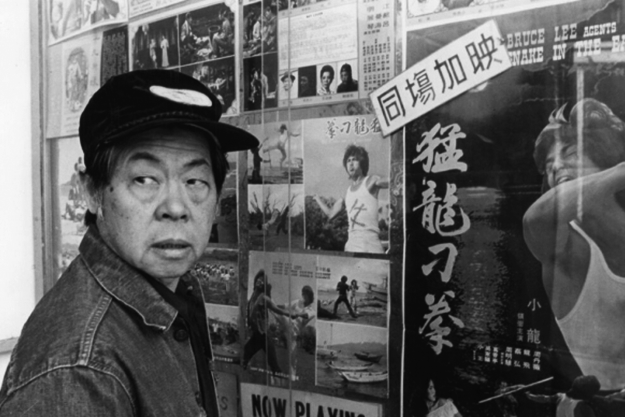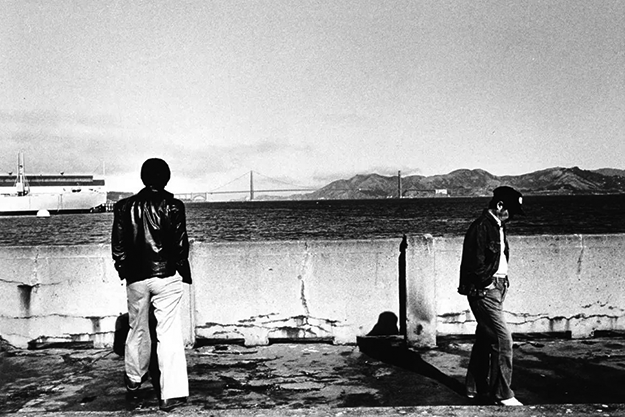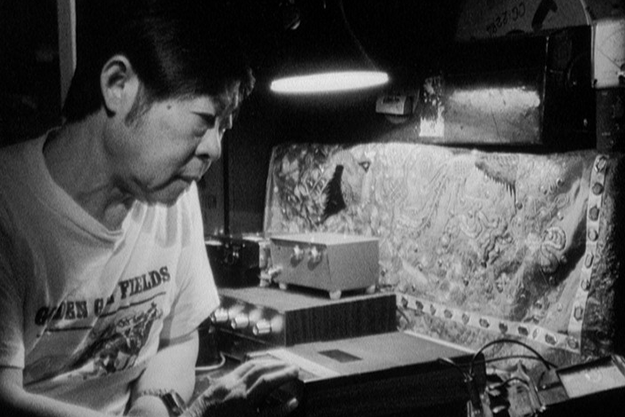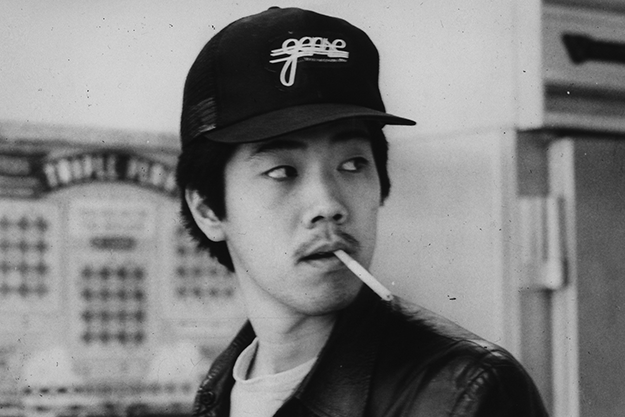Film of the Week: Chan Is Missing

It’s hard to think of anything as susceptible to the effects of time and social change as identity politics. So you certainly couldn’t call Wayne Wang’s Chan Is Missing an authoritative, timeless picture of what it means to be Chinese-American. It wouldn’t even be true to call it say it was a representative depiction of what it meant to be Chinese-American in 1982, when the film was made; rather, it ponders a range of possible identities within different social backgrounds and age groups in the San Francisco area, and that’s probably about as specific a description of the film as you can accurately attempt. Even so, Chan Is Missing—generally considered the first Asian-American fiction film to make an impression with mainstream audiences—remains not just a ground-breaking film, but also a witty, intelligent, mischievous attempt to mix identity politics (of an inquisitive, skeptical sort), social documentary, and genre parody. Thirty-four years on, it still looks brazenly inventive and bracingly fresh.
It’s a favorite party game to retrospectively read directors’ early features for clues to their later career, but you couldn’t have guessed where Wang’s career would lead him. An adept of the one-for-them-one-for-me approach, he has arguably ended up doing more films for the system than he might perhaps have liked, some of them as mainstream as they come—Jennifer Lopez romcom Maid in Manhattan (02), heart-tugging doggie drama Because of Winn-Dixie (05). And while Wang has continued to pursue Chinese themes in his work, it has generally been in films somewhat more soft-centered, emotionally and formally, than Chan—notably, his adaptation of Amy Tan’s bestseller The Joy Luck Club (93). But there’s also the Wang who continues to try unlikely experiments: the Brooklyn diptych Blue in the Face and Smoke (95, in collaboration with Paul Auster); The Center of the World (01), a Las Vegas psychosexual drama written with Miranda July; and this year’s odd While the Women Are Sleeping, a Japanese-produced story of a writer delving into the dark lives of others, based on a story by Spanish writer Javier Marías. Wildest of all is his Life Is Cheap… But Toilet Paper Is Expensive (89), a sort of pendant to Chan’s deconstructed detective story, this time a jazzy, abrasive pseudo-noir exploration of Wang’s native Hong Kong shortly before handover to China.
I first saw Chan Is Missing in the early ’80s, in a double bill with Wang’s second, rather sweeter and straighter, but still highly personal family-themed comedy Dim Sum: A Little Bit of Heart (85). I loved them both, but Chan’s black-and-white experimental nerviness has stuck with me more, because it always makes an impression when you see a director inventing their own voice right in front of your eyes. Chan Is Missing—co-written by Wang with Isaac Cronin and Terrel Seltzer—takes place in San Francisco’s Chinatown, and is narrated in voiceover by Jo (Wood Moy, an actor with a wonderfully impish, weather-beaten face), a middle-aged cab driver and an “ABC” (American-Born Chinese). After telling us that he likes to bet on how long it’ll take a passenger to ask him the best place to eat in Chinatown (an unseen, presumably WASP fare does just this, in three seconds flat), Jo explains that he and his nephew Steve (Marc Hayashi) have decided to get their own cab license, but have had to sub-lease one. A friend of theirs, one Chan Hung, has agreed to act as go-between, but has disappeared with their $4,000. The rest of the film involves Jo and Marc’s attempts to track him down—not just literally, but also to try and pin down who or what Chan is, and what he represents in terms of the complexities of Chinese identity. In other words, like all film noir gumshoes pursuing an intractable case, they’re partly in search of themselves.

Photo by Nancy Wong, 1981
That the case will be a tough one is signaled from the start by a lawyer—a deliciously comic display of earnestness by Judy Nihei—who explains that Chan has got into an altercation with a police officer, but that their discussion was doomed from the start. She explains that Chan and the cop had “different cultural assumptions about communication about communication” [sic], and that the Chinese way is to bring seemingly unrelated facts into the argument: “The Chinese language tends to emphasize the relationship between the listener, the speaker, and the action involved.” This ends up making perfect sense by the end of the film, when Jo tells Steve a paradoxical parable known as the “Chinese lantern riddle,” which involves “trying to use the negative to emphasize the positive.” Throughout the film, the seeming impossibility of tracking down the elusive Chan seems to emerge as a quintessentially Chinese predicament, which can only be solved by “thinking Chinese,” as Jo is advised—whatever that means. “This mystery,” he ponders, over a close-up shot of rippling waves, “is appropriately Chinese. What’s not there seems to have as much meaning as what is there.” But, he sighs, “I guess I’m not Chinese enough. I can’t accept a mystery without a solution.”
Quite what it would mean to be “Chinese enough” or “not Chinese enough”—let alone “appropriately Chinese”—is a riddle the film playfully worries at from every conceivable angle. A WASP cab passenger in Chinatown may have some simplistic tourist-guide preconceptions about what Chinese-ness (or “sinity,” to use Roland Barthes’s neologism) might mean, but it’s not long into Chan Is Missing before we’re dazzled by the kaleidoscopic range of variables on display—to begin with, the opposition between those who, in early ’80s Chinatown, align themselves with the Communists of the People’s Republic of China and those who identify with Taiwan. Some people present themselves as predominantly American—like Steve, who so compulsively lapses into jokey jive-talk that someone asks, “You think you’re Richard Pryor?” And there are others whose Chinese-American identity involves a kind of pan-Asian display of signs. A charismatic cook named Henry (Peter Wang, who four years later, directed his own highly rated culture-clash movie, A Great Wall) wears a T-shirt that reads “Samurai Night Fever,” and loves to dispense wiseacre one-liners at the expense of the restaurant-going rubes: “We don’t have won ton soup, we have ‘won ton’ spelled backwards—‘Not now!’”
A whole cast of figures—San Francisco nonprofessionals, for the most part, it seems, playing versions of themselves—turn up to variously incarnate different identities, and theories on what such identities might mean. George Woo, playing a language teacher, speculates on the dilemma facing newly arrived Chinese (or FOBs, as Steve puts it: Fresh Off the Boat) like Chan: their problem is wanting to remain Chinese, but then there’s the other problem of wanting to assimilate, to become American right away. George’s advice is to “mix it up,” be properly Chinese-American—and the example he gives is the famous apple pie from esteemed (now defunct) bakery Sun Wah Kue, an all-American dish that tastes different because of Chinese baking techniques.

Wang makes Chan Is Missing to a similar recipe—the film is imbued with, and is entirely about, Chinese-ness, but adopts a quintessentially American form, the film noir mystery. Breathlessly Godardian in its riffing on detective archetypes, Chan Is Missing has people forever reminding Jo that whenever you undertake a manhunt, you’re playing out a secondhand gumshoe role: an unseen character behind a hotel room door picks up on Jo’s name, and throws back Detective Joe Friday’s (apocryphal) catchphrase from Dragnet (“Just the facts”), then adds, “You see Rockford last night?” The detective who constantly emerges in conversation is that long-running, much-debated screen embodiment of “Oriental wisdom” Charlie Chan—but here, Chan is the missing person, and instead of a stereotyped Confucian mastermind, the detectives are just a couple of working stiffs wanting their investment back. Even so, a piece of advice attributed to Chan makes perfect sense as a tip for Jo and Steve, and for the viewer: “Be patient.”
Visually, Chan Is Missing has the bustling casualness of Cassavetes or of the early French New Wave—its picture of Chinatown is virtually a mini “city symphony” movie in itself, whether Michael Chin’s black-and-white photography is showing us passersby, details of shop signs, vast swathes of house fronts or vistas of Frisco hillsides (there’s also a nice wink at Vertigo). The film plays atmospherically on genre tropes, too: a close-up of a gun in darkness (which ends up playing no role whatsoever), the moody chiaroscuro interior of Jo’s apartment, which a bulky early-’80s answering machine makes look like a whole recording studio.
The use of sound too is superbly inventive—apart from sampling Chinese pop, there are touches of Chinese opera, film noir suspense chords and, as deliciously ironic closer, Pat Suzuki singing “Grant Avenue” (“A Western street with Eastern manners”), the hymn to Chinatown from Rodgers and Hammerstein’s musical Flower Drum Song. Wang expressly makes things tough for the Western viewer—lots of Chinese dialogue, sometimes overlapping, presented at length without subtitles—and indeed, for the viewer in general: a key conversation is obscured by a loud surge of hard rock.

Photo by Nancy Wong, 1981
We finally see Chan in a photo that shows him standing in the darkened doorway, his features barely visible—perhaps not accidentally recalling the similarly elusive Harry Lime in The Third Man. Is Chan “too Chinese,” as someone suggests, or a paranoid mythomaniac, or a prankster leading everyone a merry, infinitely mysterious dance (it’s said that he has “a sense of humor that doesn’t translate into English—like Don Rickles in Chinese”)? You sympathize when Jo concludes, “It’s easy to see how someone can get paranoid. I feel I’m in the same mess Chan Hung was in—except I’m not even sure what the mess is.” But the personable, extremely relaxed presences of leads Moy and Hayashi make you glad to be in the mess with them. The sociocultural specifics of Chan Is Missing may have drastically changed meaning in 34 years, and it would be interesting to read a Chinese-American critic’s reappraisal of it now. Otherwise, this is surely one of the U.S. independent films of the ’80s that most seems as fresh and as audacious as it did when it was made.
Revival screenings of Chan Is Missing in a new 35mm print continue at Metrograph from September 19 to 21.
Jonathan Romney is a contributing editor to Film Comment and writes its Film of the Week column. He is a member of the London Film Critics Circle.







